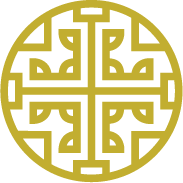Lent Day 6
God’s Rainbow by Hannah King
Genesis 9:8-17, “Then God said to Noah and to his sons with him, “Behold, I establish my covenant with you and your offspring after you, and with every living creature that is with you, the birds, the livestock, and every beast of the earth with you, as many as came out of the ark; it is for every beast of the earth. I establish my covenant with you, that never again shall all flesh be cut off by the waters of the flood, and never again shall there be a flood to destroy the earth.” And God said, “This is the sign of the covenant that I make between me and you and every living creature that is with you, for all future generations: I have set my bow in the cloud, and it shall be a sign of the covenant between me and the earth. When I bring clouds over the earth and the bow is seen in the clouds, I will remember my covenant that is between me and you and every living creature of all flesh. And the waters shall never again become a flood to destroy all flesh. When the bow is in the clouds, I will see it and remember the everlasting covenant between God and every living creature of all flesh that is on the earth.” God said to Noah, “This is the sign of the covenant that I have established between me and all flesh that is on the earth.
The story of the flood reminds us of two things. First, the impact of sin is global. Human corruption not only affects the individuals who sin— it has ripple effects to all creation. This challenges our reductionistic, individualistic framework for morality, but it also resonates with our lived experience. Economic and racial disparity, generational patterns of brokenness and addiction, environmental pollution, and political corruption show us that the world is not as it should be. In the flood God responds to sin by washing and cleansing the whole material world.
But the flood story doesn’t only reveal the scope of our problem. It also demonstrates the scope of redemption. God’s judgment is universal, but so is his mercy. After the waters dry up, God makes a promise to all creation. He says to Noah,
“I establish my covenant with you, and your offspring after you, and with every living creature…for every beast of the earth. This is the sign of the covenant that I make, for all future generations: I have set my bow in the cloud, and it shall be a sign of the covenant between me and the earth…the waters shall never again become a flood to destroy all flesh. When the bow is in the clouds. I will see it and remember the everlasting covenant between God and every living creature on the earth.” (Gen. 9:9, 12-16)
Some commentators on this passage describe the “bow in the clouds,” the rainbow, as God’s bow of judgment pointing not down toward earth, but up into the heart of Heaven. This is one way to understand the gospel: God, in Christ, assumes into Himself the judgment due to humanity. In the New Testament, Jesus describes this ministry as his baptism: “Are you able to be baptized with the baptism with which I am baptized?” (Mark 10:38)
Jesus’ passion is a baptism, a cleansing and purgative flood that He endures for the life of the world. In turn, our baptism in His name becomes for us an ark of salvation, through which we are saved from the flood of God’s judgment (1 Peter 3:20-21). Jesus’ baptism—both his literal baptism in the Jordan and his spiritual baptism on the cross—is an immersion into us, so that we can be saved through immersion into him. He has become a part of this world in order to save it.
Link to music: https://carolinecobb.bandcamp.com/track/that-day-2-peter
The Rev. Hannah King is an associate rector at Village Church. She loves words and tries to write, speak, read and share them regularly (some can be found here). She is very fortunate to spend half her time in parish ministry and half of her time at home with her two sons, who teach her important skills like how to fight with a sword and how to throw a paper airplane.

